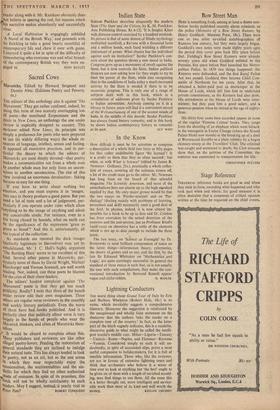In the Know HoW difficult it must be for scientists
to compress a description of a whole field into forty or fifty pages for that rather undefinable figure 'the layman'! It is a credit to them that they so often succeed : but when, as with What is Science? (edited by James R. Newman: Gollancz, 21s.), practically a whole collec- tion of essays, covering all the sciences, comes off, a lot of the credit must go to the editor. Mr. Newman has long been on the board of that splendid magazine The Scientific American, and most of the contributions here are almost up to the high standard implied by .that. My only major grouse would be that the two essays on 'Psycho-analysis' and • on 'Psy- chology' (dealing mainly with problems of learning, perception and skill) necessarily omit a good deal of the field, In physics, indeed, it is now almost im- possible for a book to be up to date and Dr. Condon has been overtaken by the actual detection of the neutrino and the anti-proton, just as Professor Read's lucid essay on chemistry has a table of the elements which is not up to date enough to include the three latest. The last essay, on 'Science as Foresight' by Dr. Bronowski (a most brilliant compression of notes on the latest things—information theory, cybernetics, the theory of games and so on), and the first, by the late Sir Edmund Whittaker on 'Mathematics and Logic,' are quite startlingly successful. In general the standard of these essays is such that, as is not usually the case with such compilations, they make the con- ventional introduction by Bertrand Russell appear


































 Previous page
Previous page